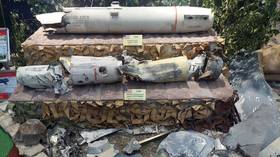What the Mainstream Media Won’t Tell You About Immigration and MS-13
from The Anti Media:
 (FAIR) In a piece for the Atlantic (6/20/18), former George W. Bush speechwriter David Frum countered statements by MSNBC’s Chris Hayes, in which Hayes described a harrowing first-person account of a mother forcibly separated from her child at the US/Mexico border as reading like “the literature of a totalitarian government”:
(FAIR) In a piece for the Atlantic (6/20/18), former George W. Bush speechwriter David Frum countered statements by MSNBC’s Chris Hayes, in which Hayes described a harrowing first-person account of a mother forcibly separated from her child at the US/Mexico border as reading like “the literature of a totalitarian government”:
 David Frum (Atlantic, 6/20/18) rejects the “extremism” of holding the US responsible for creating the conditions that force mass migration.
David Frum (Atlantic, 6/20/18) rejects the “extremism” of holding the US responsible for creating the conditions that force mass migration.“As Hayes elaborates his horror at the separation of mother from child, he seems to arrive at a conclusion that there is something inherently oppressive about any kind of immigration rule at all….The border crosser goes to them. She is not just ‘living her life … and then all of a sudden, the state can come in and wrench your life apart.’ She, of her own volition, traveled hundreds of miles to challenge the authority of a foreign state to police its frontiers. When her challenge failed—when she was apprehended and detained—what happened next must have felt harsh and frightening. But dictatorial? Totalitarian? In democracies, too, the wrong side of the law is an inescapably uncomfortable place to find yourself.”
Frum’s argument presents the US as unimplicated in the surge in Central American migration except as its victim, a “sovereign state” that must “police its frontiers.” His concluding worry about “the surges that will soon follow from the rest of the planet if the present surge is not checked” suggests he’s given little thought to the particular forces driving people from that region, much less how those relate to US foreign and economic policy.
Why those countries?
The immigrants that Frum is speaking of come largely from the Central American countries of El Salvador, Honduras and Guatemala, an area known as the Northern Triangle. According to the Pew Research Center, there are 3 million total immigrants from these countries in the US, and about half of those immigrants are undocumented. While Mexican immigration has been falling in recent years, Central American immigration has increased: from 2007 through 2015, the total number of Northern Triangle immigrants rose by 25 percent.
Yet much media coverage of immigration misses out on why large numbers of people from the Northern Triangle are migrating to the US in the first place.
Over the past three generations, the Northern Triangle countries, long marked by profound levels of inequality, have each experienced horribly destructive civil wars and military coups. Unsurprisingly, the United States has been intimately involved in each of these, supporting anti-Communist regimes during the Cold War and protecting US business interests with truly disastrous results.
In 1954, the CIA orchestrated a coup to remove President Jacobo Arbenz, the democratically elected leader of Guatemala, at the behest of United Fruit Company (now Chiquita), the country’s largest landowner. During the subsequent civil war that lasted until 1996, the US gave military and financial support to a succession of right-wing governments that committed large-scale human rights abuses that killed hundreds of thousands.
In Honduras in the 1980s, the CIA trained right-wing death squads like Battalion 316 that tortured and assassinated the government’s left-wing political opponents. In 2009, the US State Department under Hillary Clinton supported the overthrow of Honduran President Manuel Zelaya by graduates of the School of the Americas, a notorious US military training academy. The coup created waves of protests and escalated murders of hundreds of activists, including indigenous leader Berta Cáceres.
 The Reagan administration gave billions in military aid to right-wing dictatorships in Central American countries like El Salvador.
The Reagan administration gave billions in military aid to right-wing dictatorships in Central American countries like El Salvador.In El Salvador, when a military coup in 1979 sparked the formation of a leftist guerilla movement known as the Farabundo Martí National Liberation Front (FMLN), first the Carter and then the Reagan administration backed the anti-Communist junta in the ensuing civil war by supplying training, military equipment, arms and financial support totalling $6 billion. Much of the aid and arms ended up supporting the junta’s paramilitary death squads. In 1980, these death squads assassinated Catholic Archbishop Oscar Romero during a sermon, and later that year raped and murdered four American nuns. In 1981, junta forces massacred over a thousand people, mostly women, children and the elderly, in the village of El Mozote. The perpetrators, the Atlacatl Battalion, had recently completed training with the U.S. military at Fort Bragg prior to the massacre.
The CIA also funded presidential candidate and junta leader Napoleon Duarte prior to his election in 1984 in order to throw a wrench in peace talks, a move that dragged the war on for another eight years.
The Salvadoran civil war, which ultimately ended along with the Cold War in 1992, is estimated to have claimed the lives of up to 75,000 Salvadorans, including over 50,000 civilians, with 85 percent of deaths at the hands of the Salvadoran government and its paramilitary allies. Top US officials like Secretary of State Alexander Haig, Assistant Secretary of State Elliott Abrams and UN Ambassador Jeane Kirkpatrick each denied or obscured the human rights abuses and massacres in El Salvador order to maintain congressional funding for the Salvadoran military junta and other anti-Communist authoritarian regimes throughout Central America. Abrams later called the Reagan administration’s record in El Salvador “one of fabulous achievement.”
MS-13 a Policy Backfire
El Salvador provides perhaps the most striking case of how US responsibility is obscured in the current immigration debate, based on the notoriety of Mara Salvatrucha, a predominantly Salvadoran street gang better known as MS-13.
MS-13 has become a major scapegoat for Donald Trump and right-wing media in rationalizing harsh immigration policies. The Trump administration has referred to MS-13 gang members as “animals” who “infest” the United States—rhetoric that, as the Washington Post’s Greg Sargent (5/25/18) noted, “slaps the dehumanizing slur on the least sympathetic subgroup and then conflates that subgroup with the larger group that is the real target.”
This scapegoating seems to have worked: According to a recent HuffPost/YouGov survey, over 85 percent of Trump voters believe that MS-13 is a major threat to the United States as a whole. This level of anxiety seems misplaced, considering that even the Justice Department claims MS-13 has only about 10,000 members in the US.
For Salvadorans, though, the fear is very real: In 2017, El Salvador had the most murders per capita on the entire planet (109 per 100,000), followed by Honduras (64 per 100,000), with Guatemala coming in at number nine (31 per 100,000). And with stories like “In El Salvador, the Murder Capital of the World, Gang Violence Becomes a Way of Life” (ABC News, 5/17/16) and “Organised Violence Is Ravaging Central America and Displacing Thousands” (Guardian, 6/29/17), media have used that violence to fan fears of MS-13 making inroads into US cities and suburbs.
 Corporate media sources have engaged in a flurry of MS-13 coverage over the past two years.
Corporate media sources have engaged in a flurry of MS-13 coverage over the past two years.But what Trump’s racist rhetoric and fear mongering media alike ignore is that MS-13 is partially a product of US policy. The gang was actually founded in the Pico Union neighborhood of Los Angeles in the early 1980s, by Salvadoran immigrants and refugees from its civil war. Its subsequent growth from a small street gang in the US to a transnational criminal organization based out of the Northern Triangle provides an illuminating case study of how US foreign policy choices can backfire spectacularly.
Deportation’s Boomerang Effect
The violence of the Salvadoran civil war sparked a mass exodus of Salvadorans to the United States. In 1970, there were only 15,717 Salvadoran born immigrants living in the US. By 1980, there were 94,447 Salvadoran-born immigrants in the US, shooting up to 465,433 by 1990. Undocumented Salvadorans were granted Temporary Protected Status from 1990 through 1994; TPS was extended following a catastrophic earthquake in 2001, and has been periodically renewed since. However, the Trump administration recently revoked TPS for El Salvador, effective September 2019.



